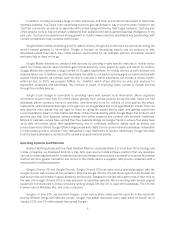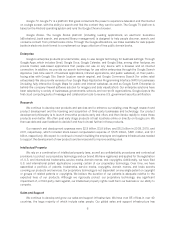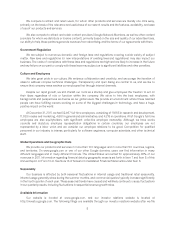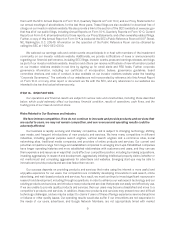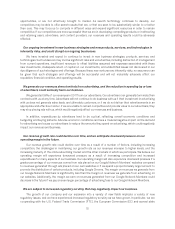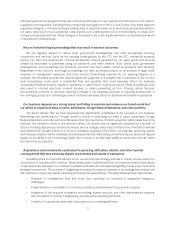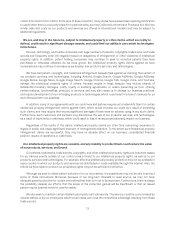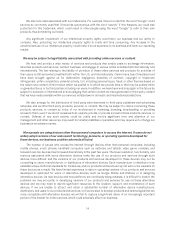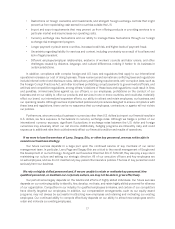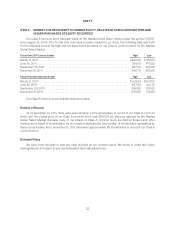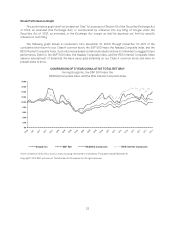Google 2011 Annual Report Download - page 43
Download and view the complete annual report
Please find page 43 of the 2011 Google annual report below. You can navigate through the pages in the report by either clicking on the pages listed below, or by using the keyword search tool below to find specific information within the annual report.We also face risks associated with our trademarks. For example, there is a risk that the word “Google” could
become so commonly used that it becomes synonymous with the word “search.” If this happens, we could lose
protection for this trademark, which could result in other people using the word “Google” to refer to their own
products, thus diminishing our brand.
Any significant impairment of our intellectual property rights could harm our business and our ability to
compete. Also, protecting our intellectual property rights is costly and time consuming. Any increase in the
unauthorized use of our intellectual property could make it more expensive to do business and harm our operating
results.
We may be subject to legal liability associated with providing online services or content.
We host and provide a wide variety of services and products that enable users to exchange information,
advertise products and services, conduct business, and engage in various online activities both domestically and
internationally. The law relating to the liability of providers of these online services and products for activities of
their users is still somewhat unsettled both within the U.S. and internationally. Claims have been threatened and
have been brought against us for defamation, negligence, breaches of contract, copyright or trademark
infringement, unfair competition, unlawful activity, tort, including personal injury, fraud, or other theories based on
the nature and content of information which we publish or to which we provide links or that may be posted online
or generated by us or by third parties, including our users. In addition, we have been and may again in the future be
subject to domestic or international actions alleging that certain content we have generated or third-party content
that we have made available within our services violates laws in domestic and international jurisdictions.
We also arrange for the distribution of third-party advertisements to third-party publishers and advertising
networks, and we offer third-party products, services, or content. We may be subject to claims concerning these
products, services, or content by virtue of our involvement in marketing, branding, broadcasting, or providing
access to them, even if we do not ourselves host, operate, provide, or provide access to these products, services, or
content. Defense of any such actions could be costly and involve significant time and attention of our
management and other resources, may result in monetary liabilities or penalties, and may require us to change our
business in an adverse manner.
More people are using devices other than personal computers to access the internet. If users do not
widely adopt versions of our web search technology, products, or operating systems developed for
these devices, our business could be adversely affected.
The number of people who access the internet through devices other than personal computers, including
mobile phones, smart phones, handheld computers such as netbooks and tablets, video game consoles, and
television set-top devices, has increased dramatically in the past few years. The lower resolution, functionality, and
memory associated with some alternative devices make the use of our products and services through such
devices more difficult and the versions of our products and services developed for these devices may not be
compelling to users, manufacturers, or distributors of alternative devices. Each manufacturer or distributor may
establish unique technical standards for its devices, and our products and services may not work or be viewable on
these devices as a result. We have limited experience to date in operating versions of our products and services
developed or optimized for users of alternative devices, such as Google Mobile and Android, or in designing
alternative devices. As new devices and new platforms are continually being released, it is difficult to predict the
problems we may encounter in developing versions of our products and services for use on these alternative
devices and we may need to devote significant resources to the creation, support, and maintenance of such
devices. If we are unable to attract and retain a substantial number of alternative device manufacturers,
distributors, and users to our products and services, or if we are slow to develop products and technologies that are
more compatible with alternative devices, we will fail to capture a significant share of an increasingly important
portion of the market for online services, which could adversely affect our business.
14



